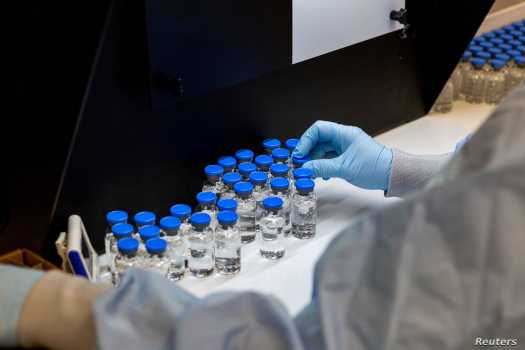Some US Hospitals Passing on Purchases of COVID Drug

Some hospitals in the U.S. have been turning down part of their allocated supply of remdesivir, the COVID-19-fighting drug made by Gilead Sciences, the U.S. Health and Human Services Department confirmed Friday.
From July 6 to September 8, state and territorial public health systems accepted about 72% of the remdesivir they were offered by HHS, a spokesperson confirmed Friday to Reuters. Hospitals then bought about two-thirds of what the states and territories accepted.
The government has been leading the distribution of the drug, but that effort expires at the end of the month, and some hospitals are stockpiling remdesivir because they don’t know what the availability of the drug will be after September and want to be prepared if the pandemic flares this winter.
Gilead did not respond to a request for comment from Reuters.
Hospital say their supplies of the drug are adequate partly because they are only using it to treat the sickest patients despite the Food and Drug Administration greenlighting its use in more cases.
Dr. Adarsh Bhimraj, an infectious disease specialist at the Cleveland Clinic, said he is skeptical about using remdesivir in patients with moderate COVID-19, especially given the price.
The resulting surplus of remdesivir, which costs $3,120 for a six-vial intravenous course, contrasts the early days of the pandemic, when the new drug was in short supply in some regions.
For the first time since mid-March, Canada has gone 24 hours without reporting a death from COVID-19, according to public health agency data released late Friday.
Canada has 9,214 deaths from COVID-19 and 137,676 confirmed cases of the coronavirus disease as of Friday, according to Johns Hopkins University data.
Most of the country’s provinces are easing their pandemic restrictions and schools are opening for in-person classes, leading to a mild uptick in infections in the last few days. The rest of the provinces, including British Columbia have added new curbs to halt the spread of the virus.
Health officials say Canada's experience with SARS, or severe acute respiratory syndrome, helped them to be better prepared. SARS killed 44 people in Canada, the only country outside Asia to report deaths from that outbreak in 2002 and 2003.
Canada's first recorded case of coronavirus was in Toronto, on January 25.
India recorded nearly 100,000 new COVID-19 cases in one day Thursday. The South Asian nation said Friday there had been 96,551 new cases in the previous 24-hour period.
India has a total of 4.5 million COVID cases.
With more than 6.4 million infections, the United States is the only country that has more COVID infections than India.
In the U.S. cases of COVID-19 are “increasingly rapidly among young adults,” according to a research letter from Harvard, published at the online site of the JAMA medical journal.
The study included 3,222 young adults between the ages of 18 and 34.
The investigation found that the young adults “experienced substantial rates of adverse outcomes: 21% required intensive care, 10% required mechanical ventilation, and 2.7% died.”

Patients with morbid obesity, hypertension, and diabetes were at “greater risks of adverse events.” The young adults with more than one of the conditions, the researchers found, “faced risks comparable with those observed in middle-aged adults without them.” Black and Hispanic patients made up more than half of the patients who required hospitalization.
A separate Centers for Disease Control and Prevention report says an investigation of symptomatic outpatients from 11 U.S. health facilities found that people who tested positive for COVID-19 were twice as likely to have reported dining at a restaurant than those who tested negative.
Johns Hopkins University reports there are more than 28 million cases of COVID-19 cases worldwide with more than 913,000 deaths.
By VOA News.